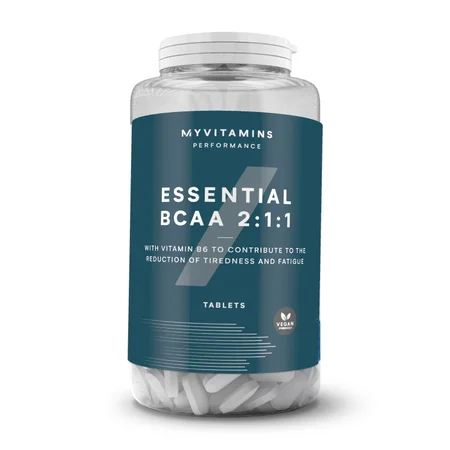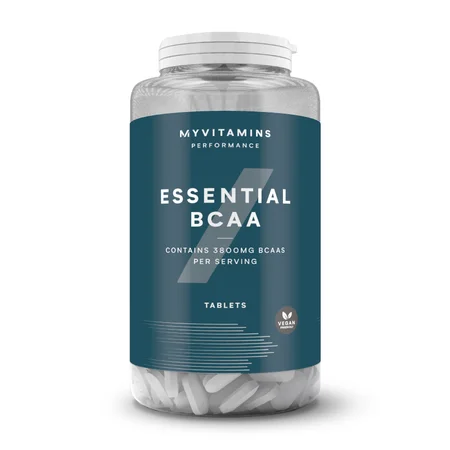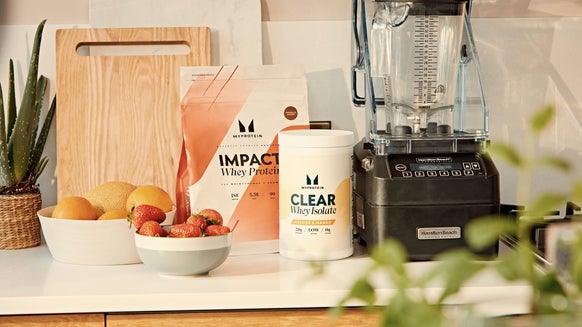What is Leucine? | Leucine Benefits, Dosage and Sources

It’s well known that protein is essential for muscle building, strength performance, recovery, and for general health, but what do you know about leucine? In this article, we’ll take you through everything you need to know about leucine and its benefits, what the research says, how much you should take and when you should take it.
- What is leucine?
- Leucine and body composition
- Leucine and athletic performance
- Leucine food sources
- FAQs

Leucine benefits the body in many different ways and is one of the nine essential amino acids and one of the three branched chain amino acids. It can’t be produced in the body and must be obtained through dietary sources. Once ingested, leucine is primarily used in skeletal muscle. Because of this, leucine has become of interest to some researchers, who have investigated its potential performance-enhancing properties.1 Considering that there are differing recommended dietary intakes of leucine (ranging from 14 to more than 45mg per kg of body mass per day in highly active individuals), it’s fair enough to conclude that it’s important that we get enough of it.2 Let’s find out why…
Benefits of Leucine
1. Beneficial for body composition
Leucine benefits muscle build by stimulating a signalling pathway that leads to the synthesis of new muscle proteins.3 Increasing muscle protein synthesis keeps you in a state of positive nitrogen balance, which is what you want to be if you’re trying to build muscle mass.
The performance enhancing (ergogenic) effects of leucine were investigated in a review with almost 1000 participants. It was reported that leucine supplementation led to greater gains of lean muscle mass and total body mass compared with those who weren’t taking leucine.4
In another study, participants who consumed 3g of leucine twice daily in combination with a 12-week resistance training programme, experienced an average increase of 1.9kg of lean muscle mass.5 It was predominantly type II (fast-twitch) muscle fibres that reaped the benefit of leucine. Type II fibres are mainly recruited for strength and explosive power exercise, such as sprinting.6
More so, the muscle-building response following leucine supplementation alone was comparable to that of complete proteins, such as whey protein concentrate, whey protein hydrolysate, and soy protein concentrate. Another bonus is leucine contains fewer calories than whey protein, so it’s a good option if you’re controlling your energy intake.
Preventing muscle breakdown
Most people don’t train 365 days a year. It’s natural and necessary to have periods away from training, whether because of injury, illness, or simply giving your body a rest. During these recovery periods, we want to avoid losing the muscle mass that took months of hard work to build. And leucine could be of help here.
You lose muscle mass when you’re in a state of negative nitrogen balance — this is when muscle breakdown is greater than muscle building. Research shows that leucine can help to prevent muscle breakdown.7 Researchers aren’t completely certain how leucine helps us maintain muscle mass but some research has shown that leucine levels are lower after a workout.2
Muscle breakdown is common during prolonged periods of muscle inactivity or immobilisation, such as bed rest. Researchers who reviewed strategies to counteract the effects of muscle inactivity highlighted leucine as key to preventing muscle loss.8
We’re more susceptible to inactivity and muscle loss as we age, so one research group chose to investigate the effect of leucine on middle-aged adults. During a week of bed rest, consuming 13g of leucine each day not only reduced the loss of lean muscle mass, but it also prevented body fat increase, which would usually be expected following reduced energy expenditure.9
So, throwing in some leucine after your workout or adding more leucine-rich foods to your diet (meat, fish, and eggs are great options) could help you maximise muscle gains when you hit the gym, or stop you losing them if you take a day off.
2. Can enhance performance
Strength
Whether you’ve never picked up a dumbbell before or it feels like a fifth limb, leucine could help take your strength performance to new levels. As mentioned before, leucine stimulates muscle growth and generally gains in muscle go hand in hand with gains in strength.
Take one study as an example: a group of untrained men embarked on a 12-week resistance training programme; half of them took 4g of leucine every day and the other half took a placebo. The five-rep max (the maximum weight they could lift for five repetitions) of both groups was measured across eight exercises. While both groups saw improvement, the group supplementing leucine got significantly stronger, seeing a 41% increase from the start of the study, compared with a 31% strength increase in the placebo group.10
3. Endurance
During strenuous endurance exercise — such as running a marathon or competing in a tennis tournament — levels of leucine in the blood notably decline, suggesting increased demand and uptake by skeletal muscle.11 It’s reasonable to think that increasing levels of leucine in the blood through supplementation could benefit endurance performance.
In a randomised double-blind study on canoeists, six weeks of daily leucine supplementation increased high-intensity rowing time to exhaustion and upper body power output. The canoeists also reported the exercise to feel easier when taking leucine.12
Strength, speed, or stamina — whatever your need, leucine could help raise the bar.
Leucine dosage and when to take
Most research supports that between 20-40mg/kg body weight per day is adequate for supporting ideal levels of leucine in the body. One study showed that the timing of leucine supplementation did not make a difference (unlike BCAAs, which are recommended before or during a workout).2,4 Keeping a consistent intake of leucine is key, especially for the effects it can have for preventing muscle breakdown on rest days.

Leucine Food Sources
| Food | Leucine content (g per 100g) |
| Beef | 2.9 |
| Chicken breast | 2.7 |
| Tuna | 2.4 |
| Seeds | 2.4 |
| Pork | 2.2 |
| Nuts | 1.5 |
| Tofu | 1.4 |
| Eggs | 1.1 |
| Milk | 0.3 |
Looking for more info on how you can boost your leucine intake?
Read this article next...

9 Foods High In Leucine
Not all proteins are equal. Here are nine protein sources which will deliver the most leucine.
Take home message
Leucine benefits us in many ways and is an essential component of your daily protein requirements for overall health and can offer various performance-enhancing properties when supplemented. Consuming as little as 4g a day on top of a balanced diet can help build lean muscle mass, increase strength, extend endurance performance, and prevent muscle tissue from breaking down.
FAQs
What are the benefits of leucine?
The main benefits of leucine include improving body composition and increased performance.
What is leucine?
Leucine is one of nine essential amino acids and one of the three branched chain amino acids. It cannot be produced in the body, and must be sourced from your diet.
What foods contain leucine?
Leucine can be found in meats such as beef and chicken, fish such as tuna, and plant-based sources such as nuts, seeds and tofu.
How does leucine improve body composition?
Leucine can benefit body composition by stimulating a signalling pathway that leads to muscle protein synthesis. It can also prevent muscle breakdown during periods of inactivity.
How can leucine improve performance?
Leucine stimulates muscle growth, and it also helps build strength when paired with resistance training. Supplementing leucine may also improve endurance, as it replenishes leucine levels that are depleted during exercise.
READ THESE NEXT:

Liam is a certified sport nutritionist with the International Society of Sport Nutrition and is enrolled on the British Dietetics Association’s Sport and Exercise Nutrition register. He has a Bachelor’s of Science in Sport and Exercise Science and is graduate of the ISSN Diploma in Applied Sport and Exercise Nutrition.
Liam is an experienced personal trainer, helping clients reach their health and fitness goals with practical, evidence informed exercise and nutrition advice. In his spare time Liam has competed in numerous powerlifting competitions and enjoys hill walking, football and expanding his recipe repertoire in the kitchen.Find out more about Liam's experience here.
1Matthews, D.E., Motil, K.J., Rohrbaugh, D.K., et al. (1980). Measurement of leucine metabolism in man from a primed, continuous infusion of L-[1-3C]leucine. American Journal of Physiology, 238(5), pp. 473-479. doi:10.1152/ajpendo.1980.238.5.E473
2Mero, A. (1999). Leucine Supplementation and Intensive Training. Sports Medicine, 27(6), pp. 347-358. doi:10.2165/00007256-199927060-00001
3Ananieva, E.A., Powell, J.D., Hutson, S.M., (2016). Leucine Metabolism in T Cell Activation: mTOR Signaling and Beyond. Advances in Nutrition, 7(4), pp. 798-805. doi:10.3945/an.115.011221
4Komar, B., Schwingshackl, L. & Hoffmann, G. (2015). Effects of leucine-rich protein supplements on anthropometric parameter and muscle strength in the elderly: A systematic review and meta-analysis. The journal of nutrition, health & aging, 19(4), 437-446. doi.org/10.1007/s12603-014-0559-4
5Mobley, C.B., Haun, C.T., Roberson, P.A., et al. (2017). Effects of Whey, Soy or Leucine Supplementation with 12 Weeks of Resistance Training on Strength, Body Composition, and Skeletal Muscle and Adipose Tissue Histological Attributes in College-aged Males. Nutrients, 9(9), pp. 972. doi:10.3390/nu9090972
6Greenhaff, P.L., Nevill, M.E., Soderlund, K., et al. (1994). The metabolic responses of human type I and II muscle fibres during maximal treadmill sprinting. The Journal of Physiology, 478(1), pp. 149-155. doi:10.1113/jphysiol.1994.sp020238
7Duan, Y., Li, F., Li, Y., et al. (2016). The role of leucine and its metabolites in protein and energy metabolism. Amino Acids, 48(1), 41-51. doi.org/10.1007/s00726-015-2067-18Gao, Y., Arfat, Y., Wang, H., et al. (2018). Muscle Atrophy Induced by Mechanical Unloading: Mechanisms and Potential Countermeasures. Frontiers in Physiology, 9(235). doi: 10.3389/fphys.2018.00235
9English, K.L., Mettler, J.A., Ellison, J.B., et al. (2016). Leucine partially protects muscle mass and function during bed rest in middle-aged adults. The American Journal of Clinical Nutrition, 103(2), pp. 465–473. doi:10.3945/ajcn.115.112359
10Ispoglou, T., King, R.F.G.J., Polman, R.C.J et al., (2011). Daily L-Leucine Supplementation in Novice Trainees During a 12-Week Weight Training Program. International Journal of Sports Physiology and Performance, 6(1), pp. 38-50.doi:10.1123/ijspp.6.1.38
11Strüder, H.K., Hollmann, W., Duperly, J., et al. (1995). Amino acid metabolism in tennis and its possible influence on the neuroendocrine system. British Journal of Sports Medicine, 29(1), pp. 28-30. doi:10.1136/bjsm.29.1.28
12Crowe, M.J., Weatherson, J.N., Bruce F. Bowden. (2006). Effects of dietary leucine supplementation on exercise performance. European Journal of Applied Physiology, 97(6), pp. 664-672. doi:10.1007/s00421-005-0036-1
13Ananieva, E.A., Powell, J.D., Hutson, S.M. (2016). Leucine Metabolism in T Cell Activation: mTOR Signaling and Beyond. Advances in Nutrition, 7(4), pp. 798-805. doi:10.3945/an.115.011221










